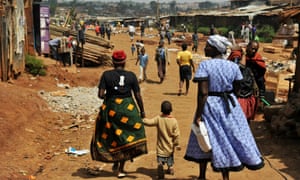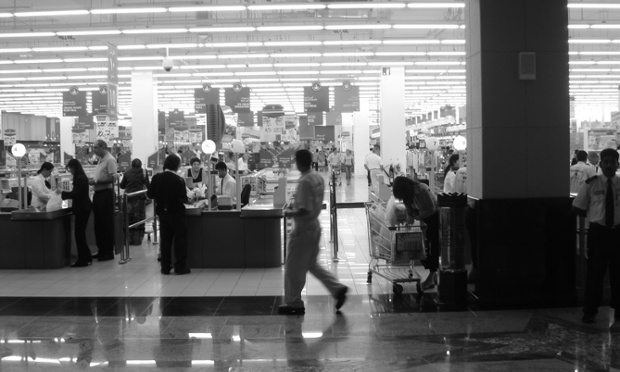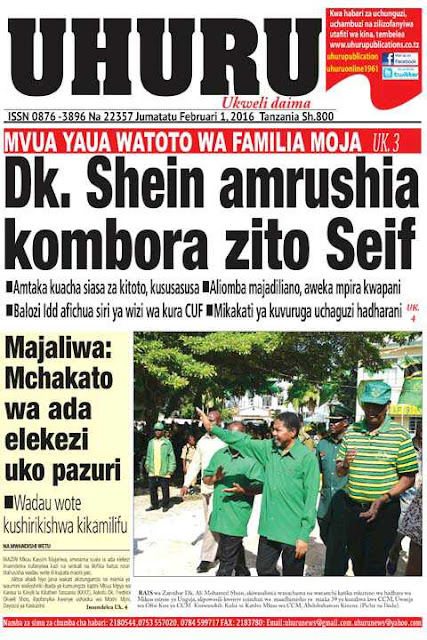Pamlomo24 is essentially a digital news platform that shares different types of news updates — social, political, economic, sports, entertainment, and community stories. From the context you’ve given, it is based in Iringa, Tanzania, and functions mainly as an online outlet (likely through social media such as Facebook, YouTube, or other channels) where audiences can get real-time updates.
Sunday, 31 January 2016
Twenty Sixth (26th) Ordinary Session of the Assembly of the Union
Addis Ababa, 30 January 2016-African Union Commission Chairperson Dr Nkosazana Dlamini Zuma has called for consideration of proposals for free movement of people in Africa, for leaders to place people at the center of Agenda 2063, to advance the human rights of all peoples, to put an end to the culture that limits the participation of women and girls. Dr Dlamini Zuma also called for an end to indifference to the needs of others, and that of the people of the Saharawi Arab Democratic Republic.
Speaking at the opening session of the 26th Ordinary Session of the Assembly of the African Union in Addis Ababa today, the AUC Chairperson also congratulated a group of Zimbabweans who sang a song dedicated to Agenda 2063, and encouraged artists everywhere to embrace the Agenda “as it is our individual and collective aspirations that are captured in it”. The song was introduced to the Heads of State and government, their delegations and other summit delegates at the beginning of the opening ceremony proceedings.
“The great diversity of Africa is its biggest strength and enduring spleandour”, said Dr Dlamini Zuma, referring to Africa’s ancient civilisations, the wealth of its minerals, its natural beauty, flora and fauna, and abundant energy reserves, which are necessary for Africa’st ransformation. However, Dr Dlamini Zuma lamented the paradox between this richness and the fact that “the majority of Africans are poor”.
Urging Africa to resolve this paradox, she said “We have allowed for far too long, the diversity of our lands, soil, workforce, oceans and forests to be taken away as raw materials, thus exporting jobs and supplementary revenue streams, along with the means of our own development”.
Turning to the theme of the summit “Year of Human Rights with a focus on the Rights of Women”’ Dr Dlamini Zuma said Africa must continue to place people and their basic human rights at the center of Agenda 2063. She observed that under Agenda 2063, Africa has refused to be indifferent or silent about the evil of violent extremism, gender based violence, the suffering and misery of people as a result of wars and conflict, before adding that the African pledge under the agenda is to use its diversity as a force for peace and democracy.
Dr Dlamini Zuma said the continent must put an end to the culture that limits the full participation of women and girls in all spheres of society if it is to realise its full potential. “There is progress, but not at the level approved in Agenda 2063”, she observed.
The AUC Chairperson reiterated the need to create jobs and equip young people with the necessary skills required to transform the continent’s transformation. In this vein, she recognised the intergenerational dialogue that took place at the African Union on the side lines of the on-going summit, recalling the desire of the youth that participated to be agents of change in the advocacy for peace. “They want to be educated and skilled, so that they can become the engine and the drivers of our renaissance and transformation”.
On Western Sahara, Dr Dlamini Zuma noted that, since Africa pushed for a referendum 25 years ago, the country now has a whole generation languishing in refugee camps. “We can no longer be indifferent to the position of the people of Western Sahara”, she added.
The Commission Chairperson extended a welcome to newly elected Heads of State, Mr John Magufuli of Tanzania and Mr Roch Marc Christian Kabore of Burkina Faso as well as President Alassane Outtara of Cote DÍvoire and President Alpha Conde of Guinea who were re-elected. In concluding her remarks, Dr Dlamini Zuma thanked President Robert Mugabe who was Chairperson of the Union in 2015 for his “excellent guidance”.
United Nations Secretary General Mr Ban Ki Moon congratulated the AU for deciding to focus on human rights as its theme for 2016. He said women should be able to fully take part in society, including in the highest levels of state structures and in peace and security. The age of exclusion is over, he announced. Mr Ban Ki Moon welcomed the AU proposal to deploy human rights observers to Burundi.
In his last address as UN Chief, he applauded the efforts of the African Union Mission in Somalia (AMISOM) in bringing peace to Somalia. He also said he was impressed by the many health workers who rushed to help in the Ebola affected countries “while the world was running away”, adding his appreciation for the leadership of the AU and its efforts to deploy hundreds of health workers.
Mr Mahmoud Abbas President of the State of Palestine and Chairman of the Palestine Liberation Organisation Executive Committee acknowledged Africa’s continued support for the liberation of Palestine. “The status quo cannot be accepted any longer and we will continue working to achieve and reach our national rights and to develop our economy”, he said.
In his last speech as Chairperson of the AU, Zimbabwe’s President Robert Mugabe lamented the continued dominance of the developed countries over world affairs, as well as the lack of African representation in the UN Security Council. Loud cheers erupted when he called for reform of the United Nations.
Mr Mugabe dwelt on issues of peace and security saying that, despite continuing conflicts in some parts of the continent, “we witnessed some successes and overall, there was political stability”. He complimented the Amani Field Exercises II, saying it means the continent can now deploy the African Standby Force as a tool for conflict prevention and a step towards silencing the guns. He too called for the freedom of the people of Western Sahara. President Mugabe said climate change has become a real threat, saying the current El Nino phenomenon is increasing chances of hunger and disease.
On the organisation of summits, the President reported that the Heads of State and Government had resolved to begin their summits, as they did today, in closed session to discuss topical issues such as peace and security, governance and financing of the African Union.
Before the summit opening ceremony concluded, a new Chairperson to take over from President Mugabe was announced. President Idriss Deby Itno of Chad will be the Chairperson for 2016. In his acceptance speech, he urged the continent to take advantage of its increased profile in the international system and organise itself to defend its interests. He also said there was need to give the AU the means to attain its objectives, saying it is unacceptable that the functioning of the AU is financed by the outside world. He urged the continent to be action oriented in order to change its history. He spoke strongly against terrorism, saying the continent should ensure its own security using its own human resources.
Meanwhile, the full new bureau to serve with Mr Deby was announced as follows: First Vice Chairperson – President Yayi Boni of the Republic of Benin; Second Vice Chair- President Paul Kagame of the Republic of Rwanda; Third Vice Chair – President Nouri Abdusahim of Libya; Rapporteur- President Robert Mugabe of Zimbabwe. WZM
Secret aid worker: How can we fight inequality if we live as privileged expats?
After starting out wanting to reduce poverty, aid workers often find themselves living a lifestyle unimaginable back home. Does this cause more harm than good?
 People tell you how much they struggle to pay school fees and you feel ashamed: what you spend on your ticket home could have kept them in education. Photograph: Roberto Schmidt/AFP/Getty Images
People tell you how much they struggle to pay school fees and you feel ashamed: what you spend on your ticket home could have kept them in education. Photograph: Roberto Schmidt/AFP/Getty Images
Awareness of your own privilege in relation to the rest of the world is often a motivator for people drawn to humanitarian or development work. The ironic twist is that in this profession we are transformed from unremarkable young people into a little aristocracy.

Secret aid worker: sometimes I go to supermarkets to escape the loneliness
Read more
People from the developed world usually feel uncomfortable with the idea of house help at first, but are quickly eased into the idea by convenience and the absence of washing machines and dishwashers. Security is the justification for massive 4x4 vehicles as the only means of transport – there goes the environmentally friendly convictions of former public transport commuters. The same concerns add security guards to the necessary house staff. If you have a garden you can easily have a staff of five people working in your house. Aid workers with children are likely to have a nanny and cook. Throw in a driver and you find yourself managing a 10-staff household.
Then comes the discussions about their salaries. You don’t want to seem stingy and perpetuate the local poverty economy, as you couldn’t live with yourself knowing that someone who works for you is struggling to feed their own children. But at the same time you don’t want to pay an unusually high amount and be taken advantage of, be ostentatious, or give the impression you are very rich.
Your friends make it seem normal to send their house help to do groceries, and that’s attractive because when you show up at the local farmer’s market you get mobbed like a celebrity. Every time you park your car it is surrounded by people begging and you can’t justify going around town distributing dollars left, right and centre. The other expatriates don’t seem to do that. Suddenly the level of inequality you saw in your home country is nothing compared to the inequality in your duty station. Now there is no denying you are the privileged 1%.
Some days you have more money in your pocket than most people will make in a year. You hear tales of someone’s daughter who would be delighted to come iron your clothes for a bit of pocket money. People tell you frequently of how much they struggle to pay school fees for their six or 11 children, or to send their kids to university. You feel ashamed of yourself. What you spent on your ticket home for rest and relaxation could have kept all their children in school for years. But you also tell yourself that they should know the importance of family planning. You become unsure of the moral ground.

Secret aid worker: NGOs rarely say no to corporate cash
Read more
With time, you get used to the high salaries, the allowances, perks and generous leave. But as you spend more time in bureaucratic office jobs than carrying out food distributions to the starving, you ask yourself whether you are giving back to the world at all. You question whether you are in that place to help the local people or to help yourself. It has to be wrong to arrive in someone’s country and have a better quality of life than 99% of the local population, to roll around the place in your huge land cruiser throwing dust on to the locals.
During your work time you are trying to address issues related to poverty and war, but in your free time you and your friends go out and get drunk, laugh, dance, are very loud and behave like teenagers who recently found freedom. You see expatriates taking home local prostitutes at the end of the night. You ask yourself what kind of values you are projecting and what kind of impression you are leaving on the local people, but then you get too drunk to care all that much.
Do you have a secret aid worker story you’d like to tell? You can contact us confidentially at globaldevpros@theguardian.com – please put “Secret aid worker” in the subject line.
Join our community of development professionals and humanitarians. Follow@GuardianGDP on Twitter.
Corruption remains a huge challenge for African economies
A poll last month by Transparency International found that a majority of Africans feel corruption on the continent is getting worse.
It turns out they may be right. Sub-Saharan Africa tied Eastern Europe and Central Asia for the most corrupt region in the world, according to Transparency International’s 2015 Corruption Perceptions Index. Of the 46 countries surveyed for the annual index released yesterday (Jan. 28), 40 were found to be showing “a serious corruption problem” in their public sectors. Almost 90% of African countries scored less than 50 out of the best of a 100, securing an average score of 33 overall. This is 10 points below the global average.

“Indicators for rule of law and justice score particularly badly,” Chantal Uwimana, Transparency International’s director for sub-saharan Africa, said in the report. “While some governments are reducing risks for business, there’s little change for citizens—as systemic corruption leaves many countries struggling to uphold basic rule of law.”
Of particular concern is the fact South Africa, Nigeria and Kenya— three of the continent’s biggest economies, have shown little signs of improvement on the group’s index, barely budging from the ranking positions they’ve held in recent years.
Botswana leads the continent with a score of 63, making it the least corrupt country in Africa. Meanwhile, a series of anti-corruption moveshave led to Senegal significantly improve its standing in the index gaining eight points from its 36 score in 2012.
New governments in Nigeria and Tanzania have dedicated significant chunks of their newly acquired political capital towards fighting corruption. Muhammadu Buhari in Nigeria has ordered investigationsinto influential figures in Africa’s largest economy, including the country’s former national security advisor and its minister of oil in the previous administration.
Meanwhile in Tanzania, the newly elected government of John Magufuli is garnering praise for demonstrating a willingness to get rid of officials perceived to be corrupt. (Although some people have questioned how serious the government is on reforms, especially when it comes to issues around media freedoms).
“Corruption can be beaten if we work together,” José Ugaz, Transparency International’s chairman, says. “To stamp out the abuse of power, bribery and shed light on secret deals, citizens must together tell their governments they have had enough.”
The reality is not that simple. Kenya, for example, was rocked by multiple corruption scandals last year. But a recent survey by Aga Khan University’s East African Institute showed that a significant number of young people in east Africa’s largest economy are okay with corruption as long as it helps advance their personal ambitions. In fact, half of those surveyed told pollsters that it doesn’t matter how a person makes money, as long as it doesn’t land them in jail. Meanwhile, over a third said they would take or give a bribe. This response shows the extent of the challenge facing anti-corruption efforts on the continent.
An African Union (AU) study in 2002 showed that corruption had cost Africa’s economies close to $150 billion in the 1990s, a quarter of the continent’s output. Meanwhile, researchers at the Brookings Institution say in Africa up to 3% of household income is spent on bribes.
But corruption is not just an African problem. Transparency International’s index found not a single country in the world to be corruption free. Its findings shows that over two thirds of states surveyed are corrupt half of them G20 economies.
Transparency International said it was hopeful of the power of the people to keep governments in check, as demonstrated by anti-corruption protests in South Africa and Kenya. “The 2015 Corruption Perceptions Index clearly shows that corruption remains a blight around the world,” Ugaz says in the report. “But 2015 was also a year when people again took to the streets to protest corruption. People across the globe sent a strong signal to those in power: it is time to tackle grand corruption.”
The world’s most cutting-edge renewable tech is powering rural Africa
Topping up in Sierra Leone. (Azuri)
Distributed power—where electricity is generated locally, instead of delivered via complex grid infrastructure—makes lots of sense for Africa. About 600 million Africans don’t have electricity. But sunlight is a widely available resource across most of the continent, making distributed solar power one of the more sensible options for electrification.
Plenty of companies see the potential. This has made parts of Africa a testing ground for cutting-edge solar power. Some countries are developing a whole new type of infrastructure not seen elsewhere in the world: mobile-phone-led, flexible, and controlled by the user rather than big utilities and government.
“We are now seeing the first innovation where the leading technologies are actually being deployed in Africa, not being deployed in the mainstream West,” said Simon Bransfield-Garth, CEO of Azuri Technologies.
Azuri is based in Cambridge, UK, and installs rent-to-buy solar systems for homes in Tanzania and several other sub-Saharan states. Power from the panels are paid for by mobile phone or scratchcard.
The payments also serve as installments towards owning the system outright. After about 18 months the homeowner has typically paid off the cost of the panels, or can buy them for a very small sum (say, $5).
Bransfield-Garth noted that other innovations, like mobile money, have blossomed first in Africa. The same now goes for energy, with cutting-edge technologies leaving traditional alternatives far behind.
“We’re putting together a product that’s got the latest LED lights, it’s got lithium iron phosphate batteries which are similar to the batteries you get in Tesla supercars, we’ve got adaptive smart metering inside the product, and we’ve got artificial intelligence in the product,” he told Quartz.
“And these are in $50 solar home systems that are sitting in rural Africa. And I compare that to the room I’m sitting in right now [in England], where light is controlled by two bits of wire and a mechanical switch, and has been for 150 years.”
Azuri has installed about 60,000 systems so far in Tanzania, Kenya, Ethiopia, Uganda, Sierra Leone and others. In November, it was recognized by the UN as one of 16 companies genuinely making a difference in the quest to halt climate change.
Others are getting into the act. Off Grid, a company focusing on Tanzania, also has a pay-as-you-go model, while M-Kopa covers that country as well as Kenya and Uganda.
Compare these state-of-the art systems to the often arduous process of getting solar panels installed on a home in Europe or America, and it becomes clear that Africa is not only a massive market for off-grid solar, but the leading one. Quartz Africa Weekly
Subscribe to:
Comments (Atom)
ASAS AWATOA HOFU WANANCHI KUHUSU VURUGU ZA UCHAGUZI
MJUMBE wa Kamati Kuu ya Chama Cha Mapinduzi (CCM) Taifa, Salim Abri Asas , amewataka wananchi kujitokeza kwa wingi kupiga kura katika Uchagu...

-
Iringa. As Tanzania marks 26 years since the passing of the Father of the Nation, Mwalimu Julius Kambarage Nyerere — a passionate advocate ...
-
Peter Mbata's the Deputy Headmaster and Amon Chota (academic master). Headmaster of Ifunda Technical School, Mpambwe Paul ...
-
KIKUNDI cha Upendo ni kikundi cha kina mama 20 walioamua kujiunga kwa pamoja na kuanz...








































